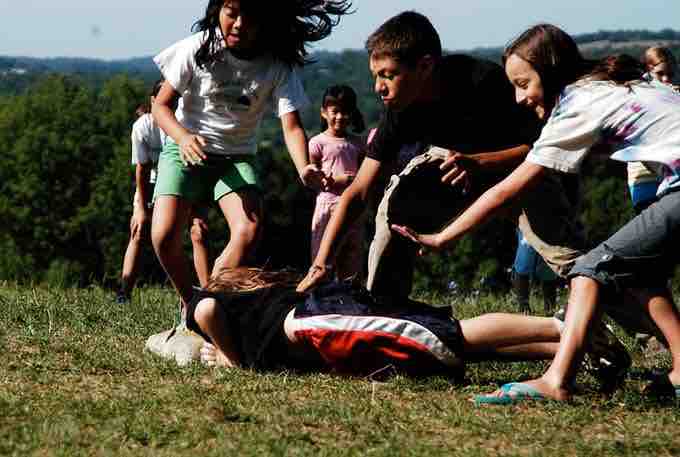Although schools' manifest function is to educate and train intelligence, they also have latent functions like socializing students. Students who do best in school are not always the most intelligent, but are usually culturally competent and sociable. The manifest function of education is to transmit knowledge to students. However, education also offers several latent functions, one of which is to foster social skills. Like the academic skills learned there, the social skills learned in school turn out to be quite important to a student's future success in life . Students who score high on measures of sociability earn more money and get more education than equally intellectually gifted students who achieve lower scores in social skills.

Children Playing
Inequality can arise from students' different levels of social skills.
Manifest and Latent Functions
Manifest functions involve things people expect or can observe. In the above paragraph, it is the purpose of and people expect a school to teach or transmit knowledge. Latent functions are not generally recognized or intended; rather, they are a secondary effect of manifest functions. For example, it is not stated in the curriculum that children learn social skills at school, but as a result of being around and working with other children, socialization occurs. Socialization is slowly transforming into a manifest function, especially within special education and working with children on the autism spectrum, who suffer from serious social skill deficits. In these cases, social skills training is part of the curriculum for those particular children.
Educational Capital
The term educational capital is a concept that expands upon the theoretical ideas of French sociologist and anthropologist Pierre Bourdieu who applied the notion of capital to social capital, cultural capital, and symbolic capital. Pierre Bourdieu and Basil Bernstein explored how the cultural capital of the dominant classes has been viewed throughout history as the "most legitimate knowledge. " How schools choose the content and organization of curriculum and instructional practices connects scholastic knowledge to dynamics of class, gender, and race both outside and inside our institutions of education. Educational capital refers to educational goods that are converted into commodities to be bought, sold, withheld, traded, consumed, and profited from in the educational system. Educational capital can be utilized to produce or reproduce inequality, and it can also serve as a leveling mechanism that fosters social justice and equal opportunity. Therefore Bourdieu's perspective reveals how objective structures play an important role in determining individual achievement in school, but allows for the exercise of an individual's own free will and abilities to overcome these barriers, although this choice is not without its penalties.
Academic Capital
Academic capital is a term used by sociologists to represent how an individual's amount of education and other academic experience can be used to gain a place in society. On an individual level, academic capital influences and informs several important aspects of life. In the most basic sense, academic capital is strongly tied to earning potential. Individuals with only a high school diploma, on average, make $20,000 less annually than individuals with an undergraduate degree, according to the U.S. Bureau of Labor Statistics. For individuals who do not have a high school degree, opportunities for monetary earning fall further, $30,000 less than those with a degree.